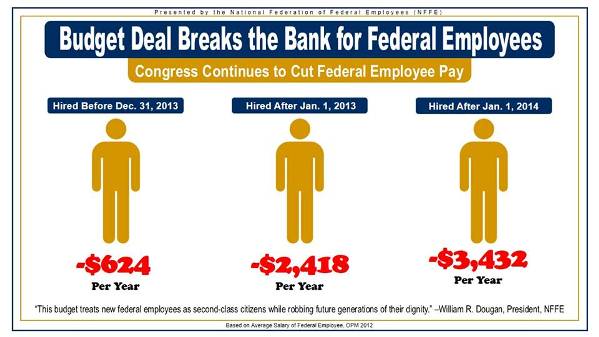 |
| Under a budget deal reached in Congress, federal employees hired after January 1, 2014 will be forced to contribute 4.4 percent towards their pensions. |
The U.S. Senate looks poised to pass a federal budget that prevents another government shutdown and replaces some sequestration cuts, but also demands more damaging cuts to the federal workforce and fails to extend unemployment benefits for the long-term jobless.
The budget deal, negotiated by Rep. Paul Ryan (R-WI) and Sen. Patty Murray (D-WA), passed the House 332-94. It would again increase the amount federal employees contribute to their pensions and end unemployment insurance for more than 1.3 million jobless Americans.
To learn more about the effects of the budget deal, click here to watch a Machinists News Network interview with NFFE/IAM President William R. Dougan and Joshua Smith, a Policy Expert at the Economic Policy Institute (EPI).
“Congress needs to wake up, understand and respect federal employees,” said Dougan. “The way to do that is to stop singling them out.”
As it stands now, the budget would raise pension contributions for federal employees hired after January 1, 2014 by 1.3 percent, bringing the total contribution to 4.4 percent. New hires will see no added pension benefit despite being forced to contribute over $1,000 more on average to their pensions per year.
In 2012, similar budget cuts increased pension contributions for new federal employees by 2.3 percent.
“This change would cost newly hired federal workers a collective $6 billion over the next 10 years,” said Dougan. “This major change in federal employee pensions would bring the total that federal workers have contributed through targeted cuts to pay and benefits over the last three years to $120 billion, about $60,000 per federal worker. Congress’ repeated targeting of federal employees has been detestable, yet it continues year after year.”
Sen. Murray resisted Republican demands to cut Social Security, Medicare and Medicaid, yet the deal still clings to harmful austerity measures that have slowed the economic recovery.
In addition to the 1.3 million people who will lose their unemployment insurance on December 28 if the deal isn’t modified, another 1.9 million people would be kicked off the program in the first half of 2014.
It’s really rough for them because everybody should be celebrating the holiday and they’ll be cut-off from a lifeline,” said EPI Policy Expert Joshua Smith.
Click here to tell Congress to stop targeted cuts at federal employees.
Click here to tell your Senators and Representative to extend unemployment benefits for jobless Americans.